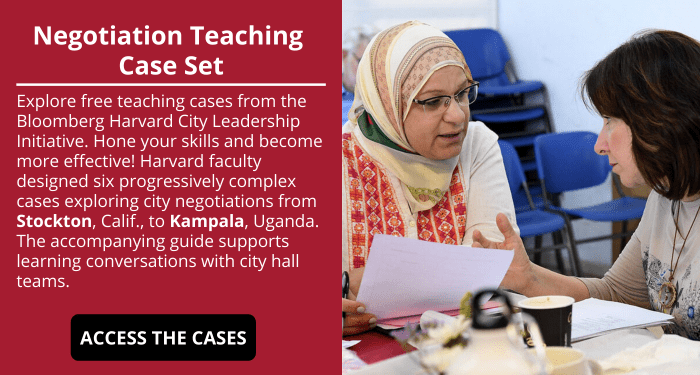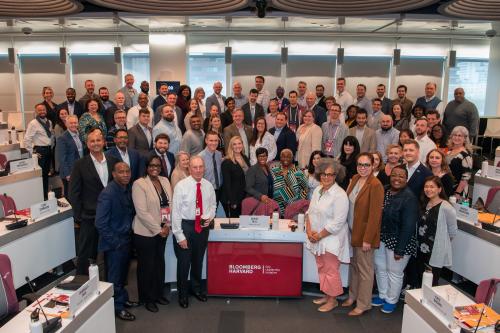Negotiation—and how every city leader can get better at it

City leaders negotiate all day, every day: contracting with a police union, renegotiating utility services, resolving a human resources conflict, passing a budget in the city council.
Yet people at the table may not always recognize that sharpened negotiation skills can make a big difference.
That’s why the Bloomberg Harvard City Leadership Initiative developed the Negotiation for City Leaders program. It’s an executive training program for city practitioners based on a newly developed curriculum built especially to help them become stronger negotiators. One key theme is that negotiation can often be a complex process, requiring methodical, intentional preparation in order to be effective in the moment.
The program kicked off this week with senior leaders from 26 city halls around the world taking part in four days of activities, simulations, peer-to-peer consultations, and discussions guided by experts from the Harvard Business School, Harvard Kennedy School, and Bloomberg Philanthropies.
To get an overview of the program’s custom curriculum as well as specific strategies mayors and their staffs can employ in negotiations, Bloomberg Cities spoke with Brian Mandell, Harvard Senior Lecturer in Public Policy, Director of the Negotiation and Conflict Resolution Collaboratory, and Chair of the Wexner Senior Leadership Program. Mandell led development of the new negotiation curriculum for city leaders.
Bloomberg Cities: How do you describe this new program—and its importance to city leaders?
Brian Mandell: Our overall goal is to build the capacity of mayors and senior leaders to be able to be both more effective in the moment, but also to be able to step back and in some cases build their effectiveness through systematic preparation. We’ve made our teaching materials freely available on our Harvard website, including a six-part Negotiation Teaching Case Set that progresses through a range of cases—from relatively simple to highly complex scenarios—allowing people to build skills methodically. Let me give you a few key points:
Mayors and their teams operate under pressure-cooker conditions. So, I've been making the case for doing what I call a “pre-mortem analysis,” rather than the standard post-mortem analysis that everyone in politics does to explain why something failed. A pre-mortem analysis assesses what the most important political, economic, psychological, and spoiler challenges are that we might face in a negotiation, so that we can prepare for those.
[Read: Enhancing your effectiveness as a negotiator]
A second piece is encouraging people, in advance of any negotiation, to do multi-stakeholder mapping—knowing the obvious players who are likely to be around a negotiating table but also the so-called “invisible stakeholders” who can range from constituents to politicians and government agencies, who can both help the person negotiating achieve his or her objectives as well as silence spoilers and naysayers.
The final piece relates to something that I've started to call “tri-sector competence.” In my view, mayors and other city hall staff need to learn the languages of the private sector and the nonprofit and civil society sectors and understand their assumptions, goals, needs, and motivations in negotiations. City practitioners increasingly need to be able to develop a sense of what the working assumptions are from those three sectors, allowing them to develop a sort of personal scorecard about areas where they need to do more work to be more effective at the negotiation table. Negotiation is a high-performance public activity in which we want to limit the so-called “R factor.” That stands for regret and remorse, meaning that we might have moved in a better direction if we had better prepared for every contingency. The bottom line here is how not to be surprised and how to perform effectively under significant pressure.
Mayors and others have many different types of power that they can use in negotiations, and you’ve written about eight of them; tell us how that plays into helping people prepare.
The eight are a mix of a formal, informal, and mixed approaches to negotiation. The argument I want to make is that these clusters are like being effective at knowing different international languages. There are points in negotiation where exercising more formal power is going to advance your objectives, but there could be negotiations where it's detrimental and a more informal kind of power is needed. The goal is to understand power as being a repertoire of moves.
To size up what type of power to use in any given situation, you need to have what we call contextual intelligence, to be able to identify the best tool or mechanism of persuasion. In some cases, that will be the formal power that a mayor or other leader has within his or her community: pounding their fist to exercise the unique institutional authority they have; exercising veto power to stop something from happening; using their convening power to bring groups together while controlling the agenda; or using shift power to toggle between multiple possible deals.
In the more informal sphere, people might exercise moral persuasion—arguing that something is simply the right thing to do for our community. You’re seeing that being used in the reaction to the terrible tragedy in Uvalde, Texas, and the call for gun-control measures. There is also value in what I call nuisance power—utilizing your access to the press, your role as a gatekeeper. Mayors and others can subtly threaten turbulence as a way to get their preferred outcome.
On mixed power, it’s a mix of formal and informal to create what I call momentum building conversations, creating expectations that something is going to happen by doing everything from using action verbs, putting up posters at a meeting, giving the sense that a course of action has been developed, we're going to pursue it and it will be up to naysayers to show we're wrong. But I think the most important sort of mixed power is coalition power. It’s a double-edged sword that can allow you to go on offense by putting a coalition of people together or to have them serve as your human shield as you try to move what might be a difficult policy forward. To use coalitions, both offensively and defensively, the more the negotiator is deeply connected to his or her community, the better. It’s the secret sauce of what I like to call “just in time” coalitions.
The larger point in looking at all eight of these types of power is that as leaders, you often have more power than you think you have in negotiation.
What’s an initial step a mayor or senior leader can take in putting these ideas into practice?
I think it begins with a kind of humility, understanding that you don’t just rely on your gut experience and that great negotiation outcomes don’t just happen. It’s more than a firm handshake. And of course I advise anyone who wants to do better to explore the online tools and resources.
Yet these could be highly successful and charismatic people accustomed to thinking, just get me in the room with someone and I can get my way.
Right—and that I’m indispensable to success. A critical part of the mindset is this notion of dispersed leadership, meaning that I can be the lead person within a team, but you can’t make change in public policy by yourself.
Another place to get started on this work is to write down for yourself a couple of instances where you had serious setbacks in negotiations and examine what went wrong, but without going to what social psychologists call accuser bias—meaning the result had nothing to do with me.
Clearly, it’s crucial to the process for mayors and others to develop mechanisms to keep their focus within an increasingly chaotic world. You think of PDFs as an email attachment, but I use it as a shorthand to remember purpose, discipline, and focus. Those who will be successful will not get distracted and derailed by the noise in the system. So, in very practical terms, you can get ready to negotiate by clearing your calendar, clearing your desk, and taking it seriously, not by just running in, taking off your top coat, wiping the sweat from your brow, and getting into the negotiation.
City leaders obviously are incredibly busy people. What are some of the ways you make this curriculum easily accessible as an off-the-shelf resource they can quickly plug into?
What I try to do is to create an easy stickiness, four or five things that they can be reminded of as they approach negotiations. Make sure you’re sending a synergistic team to the table—don’t send all glad hands, but some who can manage the process and some who can act as closers. Develop that sense of self-reflection about past negotiations and what went right and wrong. Be intentional as you approach the process.
As I have these conversations with mayors and others, I also try to be super respectful. I think they have an impossibly tough job. For me, one of the toughest things is teaching smart, successful people, because some will say, "I didn't get to this point in my life, in this job, by accident; I'm pretty good at what I do." My quick response is, "But would you like to be consistently better?" And the answer is usually, "Heck yes!"




